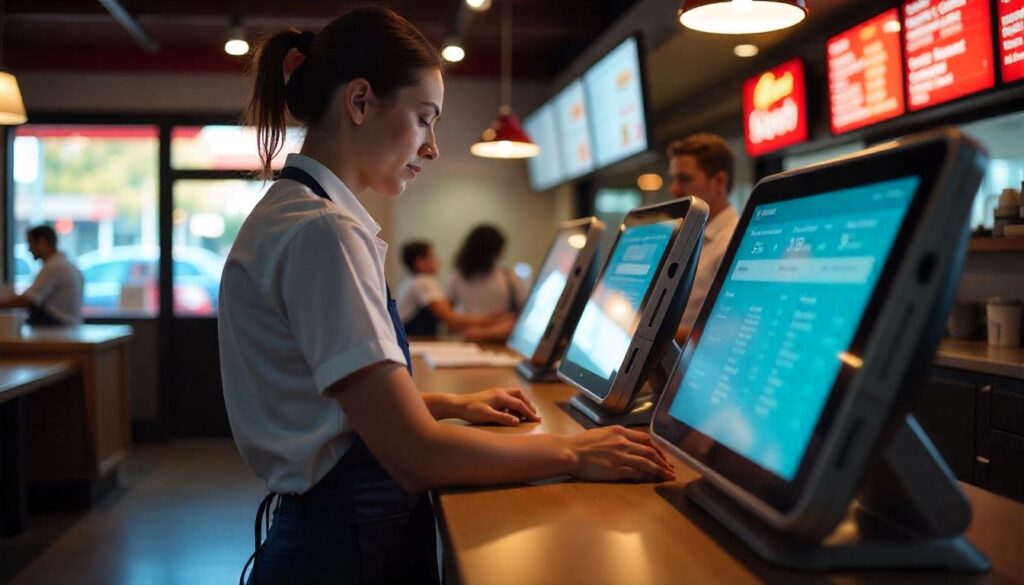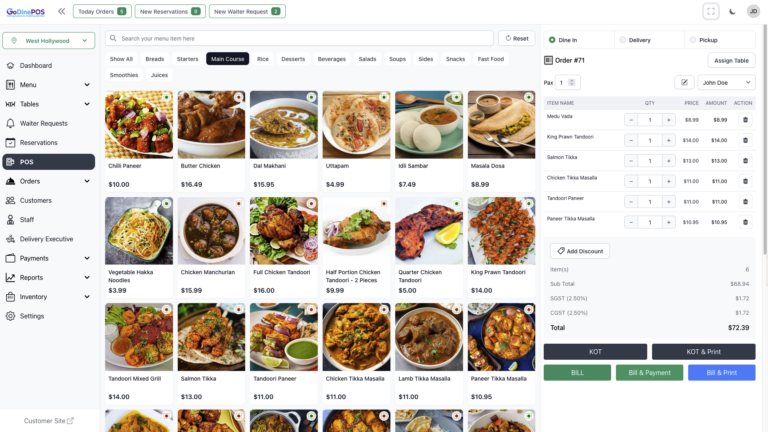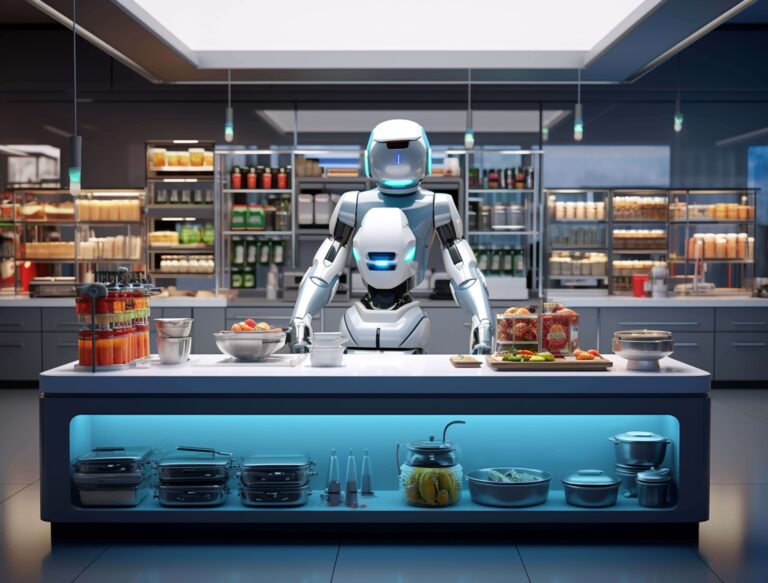Are you a restaurant owner or manager looking to streamline operations and boost efficiency? Imagine a world where your restaurant runs smoothly, with minimal hiccups, while you focus on what you love most: delivering exceptional dining experiences.
Enter cloud-based restaurant management software. This innovative technology is changing the game for eateries everywhere, offering a seamless way to manage everything from reservations to inventory. With cloud-based solutions, you can access vital data and insights at your fingertips, anytime and anywhere.
This means more time for creativity, more satisfied customers, and ultimately, more revenue. Curious about how this technology can revolutionize your restaurant? Keep reading to discover why cloud-based restaurant management software could be the game-changer you’ve been waiting for.
Benefits Of Cloud-based Solutions
Cloud-based restaurant management software offers numerous advantages. These solutions are transforming how restaurants operate. From cost savings to scalability, cloud-based systems provide essential tools. They enhance efficiency and improve overall management.
Cost Savings
Cloud-based systems save money on hardware. No need for expensive servers. Maintenance costs are reduced significantly. Software updates occur automatically, minimizing downtime. Subscription models allow predictable budgeting. Restaurants can invest in other areas.
Scalability
Cloud solutions grow with your business. Add new features easily. Scale operations during peak times. Expand to new locations seamlessly. Adjust resources to meet demand. This flexibility ensures your restaurant remains competitive.
Remote Accessibility
Access data from anywhere. Manage operations from home. Owners can check inventory online. Staff schedules are visible on mobile devices. Decision-making becomes faster and more informed. Remote accessibility boosts productivity and responsiveness.
Key Features To Look For
Choosing the right cloud-based restaurant management software is crucial. It can streamline operations and enhance efficiency. Key features in the software ensure your restaurant runs smoothly. Below are important features to consider.
Point Of Sale Integration
Point of Sale (POS) integration is vital. It connects sales, orders, and payments seamlessly. This feature reduces errors and speeds up transactions. It also provides real-time sales data. This helps in making informed decisions.
Inventory Management
Inventory management tracks stock levels accurately. It prevents shortages or overstock situations. This feature updates inventory automatically after each sale. It also provides alerts when stock is low. This ensures you have the right ingredients always.
Employee Scheduling
Employee scheduling organizes staff shifts efficiently. It ensures optimal coverage during busy times. This feature helps avoid conflicts in scheduling. It also allows employees to view their schedules online. This makes managing shifts easier for everyone.
Customer Relationship Management
Customer Relationship Management (CRM) builds strong customer connections. It stores customer data and purchase history. This feature helps in personalizing customer experiences. It also aids in creating loyalty programs. This encourages repeat visits from customers.

Enhancing Operational Efficiency
Enhancing operational efficiency in restaurants is vital for success. Cloud-based restaurant management software offers practical solutions. It simplifies daily operations, saving time and resources. This software focuses on automating tasks, providing real-time analytics, and improving communication. These features help restaurants run smoothly and efficiently.
Automating Routine Tasks
Automation reduces manual work in restaurants. It handles reservations, inventory, and billing seamlessly. Staff can focus on customer service instead of repetitive tasks. Automated systems minimize errors and increase productivity. This leads to better service and satisfied customers.
Real-time Data Analytics
Real-time analytics provide valuable insights. Managers access data on sales, inventory, and customer preferences instantly. This helps in making informed decisions. Quick access to data improves response to market trends. It ensures competitive advantage and growth.
Streamlined Communication
Effective communication is crucial in restaurants. Cloud-based software connects staff, kitchen, and management effortlessly. It updates everyone about orders and changes. This reduces misunderstandings and speeds up service. Smooth communication enhances teamwork and customer experience.
Improving Customer Experience
Cloud-based restaurant management software can greatly enhance customer experience. This technology helps restaurants offer better service and personalized interactions. By integrating smart systems, restaurants can meet customer expectations efficiently. Let’s explore how this software can improve the dining experience.
Personalized Promotions
Restaurants can use data to create personalized promotions for guests. Knowing customer preferences helps tailor offers that suit individual tastes. This approach makes guests feel valued and encourages repeat visits. It also helps restaurants build stronger relationships with their patrons.
Faster Service
Cloud-based systems streamline restaurant operations, leading to faster service. Staff can access real-time information to manage orders efficiently. This reduces wait times and improves customer satisfaction. Faster service keeps guests happy and more likely to return.
Loyalty Programs
Restaurants can easily set up loyalty programs using cloud software. These programs reward frequent diners with discounts or special offers. Loyalty programs encourage repeat business and help attract new customers. Guests appreciate the recognition, enhancing their overall experience.
Security And Data Protection
In today’s digital world, protecting restaurant data is crucial. Cloud-based management software offers robust security features. These ensure your sensitive information is safe from threats. Understanding how these systems protect data can help restaurant owners feel secure.
Data Encryption
Data encryption is a key security feature. It converts information into a code to prevent unauthorized access. Only authorized users can decode this information. Encryption safeguards customer details and financial records. It acts as a shield against cyber-attacks.
User Access Controls
User access controls manage who can view or change data. Administrators assign roles and permissions based on job needs. This limits access to sensitive information. Access controls help maintain data integrity. They prevent accidental or malicious alterations.
Backup And Recovery Solutions
Backup solutions ensure data is safe even during system failures. Regular backups store copies of important information. Recovery solutions restore lost data quickly. This minimizes downtime and protects against data loss. Reliable backups are essential for business continuity.
Choosing The Right Software
Selecting cloud-based restaurant management software simplifies operations. It offers easy access to sales, inventory, and customer data. Improve efficiency with real-time updates and intuitive interfaces, ensuring seamless management for your restaurant.
Choosing the right cloud-based restaurant management software is crucial for your business’s success. With countless options available, it’s easy to feel overwhelmed. You must find a solution that aligns with your unique goals and operational demands. Let’s break down the process to make your decision easier and more effective.
Assessing Business Needs
Before you start shopping for software, take a moment to reflect on your restaurant’s specific needs. Do you need a tool that offers robust inventory tracking, or is customer relationship management more critical for your business? Perhaps you’re looking to streamline your staff scheduling? Write down a list of features you can’t live without.
Consider your restaurant’s size and type. A bustling city café will have different requirements than a family-owned diner. Your software should address these specifics seamlessly.
Evaluating Vendor Options
Once you know what you need, it’s time to explore the vendor landscape. Look for companies that have a proven track record in the restaurant industry. Check reviews and testimonials from other restaurateurs like yourself.
Reach out to vendors with questions. How responsive are they to your inquiries? This can be an indicator of their customer service quality. You want a vendor who provides excellent software and supports you throughout your journey.
Considering Budget Constraints
Finally, let’s talk money. While it’s tempting to go for the most feature-rich software, you must consider your budget. Can you afford the upfront costs and monthly subscriptions?
Remember, it’s not just about the price tag. Evaluate the value the software brings to your business. Sometimes investing more in the right tool can save money in the long run through improved efficiency.
Have you ever splurged on a tool that was a lifesaver for your business? Balancing cost with functionality can make all the difference in your restaurant’s success.
By assessing your needs, evaluating vendors, and considering your budget, you’ll be well-equipped to choose the software that aligns with your business aspirations. What features are non-negotiable for you?
Implementation Best Practices
Effective deployment of cloud-based restaurant management software boosts efficiency. Ensure regular training for staff to maximize system usage. Monitor software updates for seamless operations and improved service delivery.
Implementing cloud-based restaurant management software can transform operations. But success depends on how it’s implemented. The right approach ensures smooth transition and adoption. This guide outlines best practices for implementation. Follow these steps for effective deployment.
Training Staff
Staff training is crucial. Employees must understand the new system. Conduct hands-on sessions. Use clear, simple instructions. Encourage questions. Provide resources like manuals. Consider online tutorials for flexibility. Training fosters confidence.
Phased Rollout
A phased rollout eases transitions. Implement features gradually. Start with core functions. Monitor progress closely. Address any issues immediately. Slowly integrate additional features. This reduces overwhelm. Phased rollouts ensure stability.
Continuous Evaluation
Regular evaluation is key. Collect feedback from users. Identify challenges faced. Analyze software performance. Make necessary adjustments. Schedule periodic reviews. Continuous evaluation keeps the system efficient. It aligns with restaurant needs.

Future Trends In Restaurant Management
Restaurant management is changing rapidly. Technology is at the heart of this change. Future trends point towards smarter systems. Cloud-based software is leading the charge. It offers flexibility and efficiency. Let’s explore what lies ahead.
Ai And Machine Learning
Artificial Intelligence is transforming restaurant management. AI tools can predict customer preferences. They help in optimizing menu choices. Machine learning improves inventory management. It reduces waste by forecasting demand accurately. AI aids in personalizing customer experiences. This leads to increased satisfaction.
Integration With Iot
Internet of Things devices are becoming crucial. They streamline operations in restaurants. IoT sensors track kitchen equipment. They alert staff for maintenance needs. Smart devices monitor food storage conditions. This ensures food safety and quality. IoT integration enhances operational efficiency. It saves time and resources.
Sustainability Considerations
Environmental consciousness is rising. Restaurants focus on sustainable practices. Cloud-based systems support eco-friendly operations. They minimize paper use and energy consumption. Software tracks carbon footprint. It helps in managing waste responsibly. Sustainability is becoming a priority in restaurant management.
Frequently Asked Questions
Which Software Is Best For Restaurant Management?
Toast, Square for Restaurants, and Upserve are top choices for restaurant management software. These platforms offer features like inventory tracking, employee scheduling, and sales analytics. Their user-friendly interfaces make them ideal for efficient operations. Choose based on your specific needs and budget.
What Is A Cloud-based Pos System?
A cloud-based POS system is a digital platform that stores sales data online. It allows businesses to access transactions from any device with internet connectivity. This system enhances efficiency, reduces hardware costs, and provides real-time data analytics for improved decision-making.
What Is A Cloud-based Restaurant?
A cloud-based restaurant operates primarily through online delivery platforms without a physical dining space. It relies on digital orders and utilizes cloud kitchens to prepare meals. This model reduces overhead costs and focuses on efficiency and convenience.
What Is Cloud-based Hotel Management Software?
Cloud-based hotel management software allows hotels to manage operations online. It handles reservations, billing, housekeeping, and more. Accessible via the internet, it offers real-time updates and data security. This software enhances efficiency and guest experience by centralizing tasks in one platform.
Ideal for modern hospitality management.
Conclusion
Cloud-based restaurant management software simplifies daily tasks. It boosts efficiency and saves time. Owners find it easier to manage inventory and staff. Real-time data helps make informed decisions. This software supports better customer service. It’s reliable, secure, and easy to use.
Small and large restaurants benefit from its features. Embrace technology to stay competitive in the market. Understand your business needs and choose wisely. The right software can drive success. Investing in digital solutions is smart for growth. Consider cloud-based options for a smooth operation.
It’s a step towards modern restaurant management.




